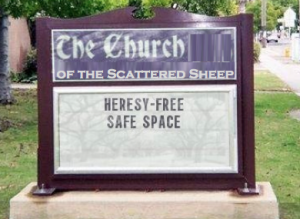The following is a guest post by Josh Porter, who left his position as a church worship leader when a new senior pastor began pressuring him to make the services more seeker friendly and experiential by incorporating popular contemporary songs that had unbiblical lyrics or came from questionable sources. At first, Josh worked to correct what he could through music choices and scripture reading, but it became apparent that he was losing this battle as others in church leadership were also pushing this shift in direction. Sadly, he and his family decided to leave this church that they had been part of for 16 years. Here are Josh’s thoughts:
“A few years back I was looking for new music to use during the Christmas season for worship. In my online search I stumbled on some beautiful Christmas songs that I had never heard before. I was baffled as to how these songs were not already in use. After further research I realized that the source was from the Latter Day Saints (Mormon), and I knew I could never use these songs even though they were biblically accurate and said all the right things. Though our people would not know the difference between these Mormon songs and Bible-based music, I could not in good conscience present songs to our congregation from a heretical source that is loaded with alternate word meanings about a false Jesus and a false Gospel.
 I view material and music from Bethel and other NAR (New Apostolic Reformation) sources the same way. If you do the work to study the teachings and practices of this movement, you will understand why I came to this conclusion. The source of worship music does matter and the meanings of the words matter as well.
I view material and music from Bethel and other NAR (New Apostolic Reformation) sources the same way. If you do the work to study the teachings and practices of this movement, you will understand why I came to this conclusion. The source of worship music does matter and the meanings of the words matter as well.
SEE OUR NEW WHITE PAPER: BETHEL, HILLSONG AND ELEVATION WORSHIP MUSIC
 There are thousands of songs available for the church to sing today, We need not dabble with questionable lyrics or heretical sources to fill our song rosters each Sunday. I assure you that it is not legalistic to test the source of a song. God’s Word commands that we test everything against the light of Scripture as the Bereans did. Discerning sources should be a regular activity for anyone who is planning music for the congregation to sing.
There are thousands of songs available for the church to sing today, We need not dabble with questionable lyrics or heretical sources to fill our song rosters each Sunday. I assure you that it is not legalistic to test the source of a song. God’s Word commands that we test everything against the light of Scripture as the Bereans did. Discerning sources should be a regular activity for anyone who is planning music for the congregation to sing.
My biggest fear in using popular music from questionable and heretical sources is that I would be pointing the way to these false ministries and giving assent to whatever congregants find on those sources’ websites, in their books and conferences, and in their sermons. Additionally, worship leaders and pastors who choose to use music from these sources are actually exposing their congregants to apostasy and enticing them to speak untruths about God and His nature through music.
Ultimately choosing worship music is the responsibility that falls not only on the worship leader, but on the leadership. Leaders are supposed to safeguard their sheep from these kind of influences. A song’s theology and its source should be tested by leaders as rigorously as their sermon content. Those leaders who ignore their responsibility to protect the sheep by letting errant and heretical teachings slip by through the music will be held to account for that. It is a serious consequence to ignore.
 Many congregants discern the music they hear based on their feelings rather than sound theology. Sadly this is another outcome of the consumerism culture that has infected the church. That’s why leaders need to protect their sheep. I don’t think many people realize how devastating the errant theology they are consuming is. Declaring false things about God, his nature, his working and the gospel is not worship! It can never be worship regardless of how passionately you sing it. God will never accept false statements, nor will He accept unholy sources as worship even if you feel warm fuzzies and tingles while singing it.
Many congregants discern the music they hear based on their feelings rather than sound theology. Sadly this is another outcome of the consumerism culture that has infected the church. That’s why leaders need to protect their sheep. I don’t think many people realize how devastating the errant theology they are consuming is. Declaring false things about God, his nature, his working and the gospel is not worship! It can never be worship regardless of how passionately you sing it. God will never accept false statements, nor will He accept unholy sources as worship even if you feel warm fuzzies and tingles while singing it.
I hope and pray worship leaders and pastors share these concerns and diligently test everything that is placed before the congregation.





